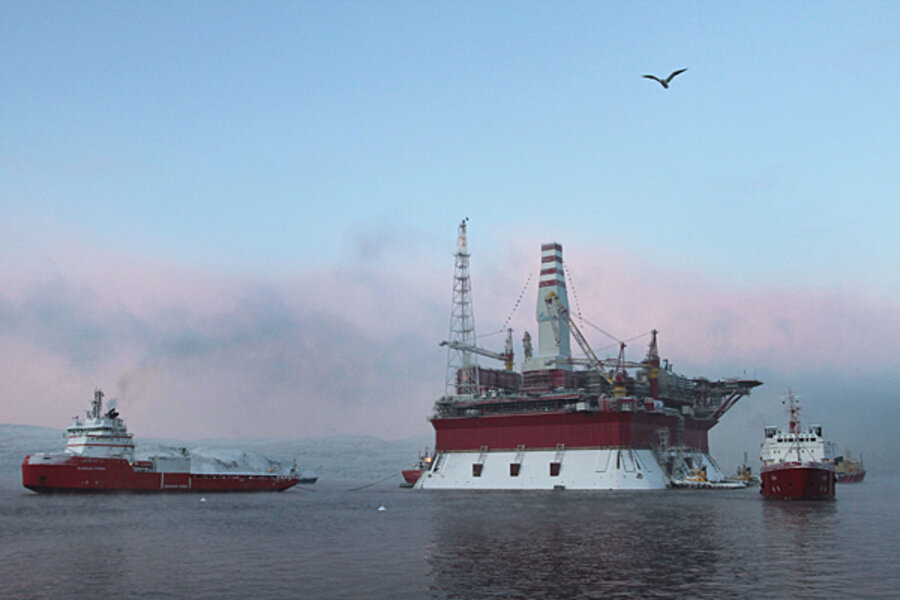Russia ships its first Arctic oil. Is a boom coming?
Gazprom sent its first shipment of oil from its controversial Russian Arctic offshore platform on April 18, a landmark event that Russian President Vladimir Putin said would contribute to economic growth. “The start of loading the oil produced at Prirazlomnaya means that the entire project will exert a most encouraging influence on Russia’s presence on the energy markets and will stimulate the Russian economy in general and its energy sector in particular,” he said. Putin was on hand to witness to first shipment of 70,000 tonnes of oil, which was loaded onto a tanker from the Prirazlomnoye platform, the same rig boarded by Greenpeace activists last fall. Despite opposition from environmentalists, Putin stated that this is merely the beginning, “this is, in fact, the beginning of our country’s enormous work on oil production in the Arctic.”
The Arctic theoretically holds 30% of the world’s remaining undiscovered oil and gas resources. Nearly 84% of the 90 billion barrels of oil are located offshore.
While Royal Dutch Shell’s bad missteps have all but killed off the Arctic oil program in the United States, Russia is moving ahead, and Putin clearly believes that the Arctic is an essential ingredient in its ability to maintain its position as one of the world’s largest oil producers. Russia gets 52% of its budget revenues from oil and gas, as well as 70% of its export earnings. In 2012 Russia produced an estimated 10.4 million barrels of oil per day with nearly two-thirds of that total coming from Western Siberia. But many of Russia’s oil fields, which have been in operation for years, are starting to decline. This has Putin looking to expand in the Arctic. Rosneft signed a deal with ExxonMobil to develop parts of the Arctic, a move that suggests that Russia needs the technological prowess from international oil companies to access remote Arctic oil fields.
But, while much has been made about the Arctic energy frontier – with headlines about how Russia is “beating” the U.S. in Arctic oil development – Russia’s Arctic prize won’t be as big as many think. The Prirazlomnoye field, which just started production, holds an estimated 530 million barrels of oil. The project is costly and would not have been economical if the Russian government had not granted it special tax breaks. But, even with heavy backing by the government, Gazprom estimates that the field will only be producing 120,000 barrels of oil per day, beginning in 2020. That would only add about 1% to Russia’s oil production. Rosneft’s projects aren’t expected to come online for at least another decade. Gazprom also wants to develop the giant Shtokman gas field, but that has been repeatedly put on ice due to high costs. On the whole, the Arctic suffers from high costs, severe weather, and a lack of infrastructure, all of which will make it exceedingly difficult for Russia to turn the region into a major source of oil production.
Still, mistrust and fear are likely contributing to a minor military buildup and the erosion of good relations in a region that up until now represented one of the few brightspots for international cooperation. This is no doubt being drastically exacerbated by the Ukraine crisis, but a zero-sum mentality over seizing the upper hand in a new region being opened up by melting ice seemingly pervades the capitals of the Arctic powers. The U.S. Navy recently announced that it would send a greater presence to the Arctic in the coming years. The Navy also cancelled a joint exercise with Russia in the region in response to Russia’s actions in Ukraine. Russia is also calling for a military buildup in the Arctic.
More recently, Canada decided to boycott a meeting of the Arctic Council in Moscow in response to the Kremlin’s actions in Ukraine. Canada is currently holding the rotating chair of the council, and has been particularly aggressive in denouncing Russia’s actions in Ukraine. In early April, former Secretary of State Hillary Clinton said that Canada and the U.S. should form a “united front” against expansionist moves by Russia in the Arctic. She warned against Russia’s military buildup in the region.
While the Ukraine crisis may be currently driving events in the Arctic, both Russia and the West fear losing out to the other in the far north, despite what appears to be a small prize.





